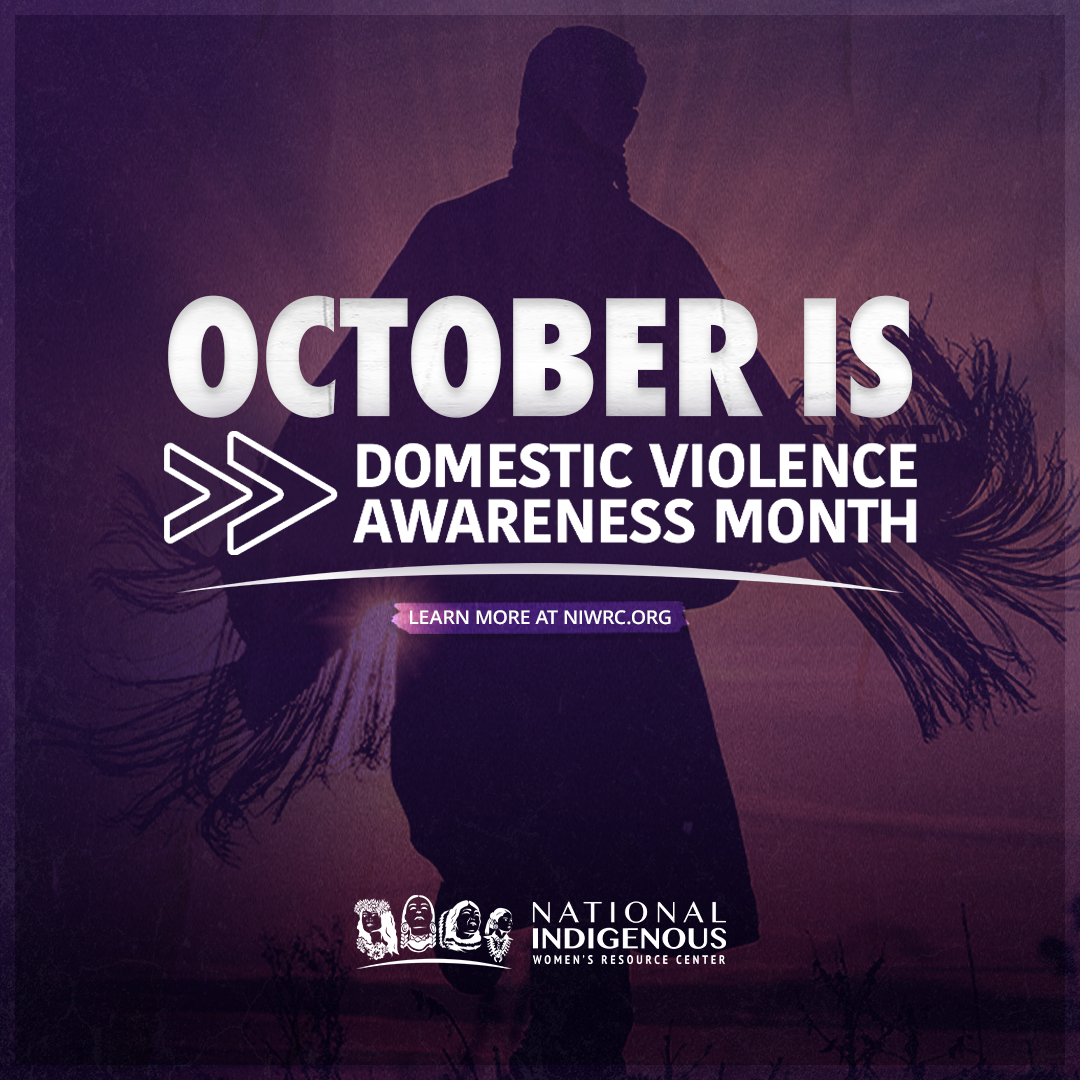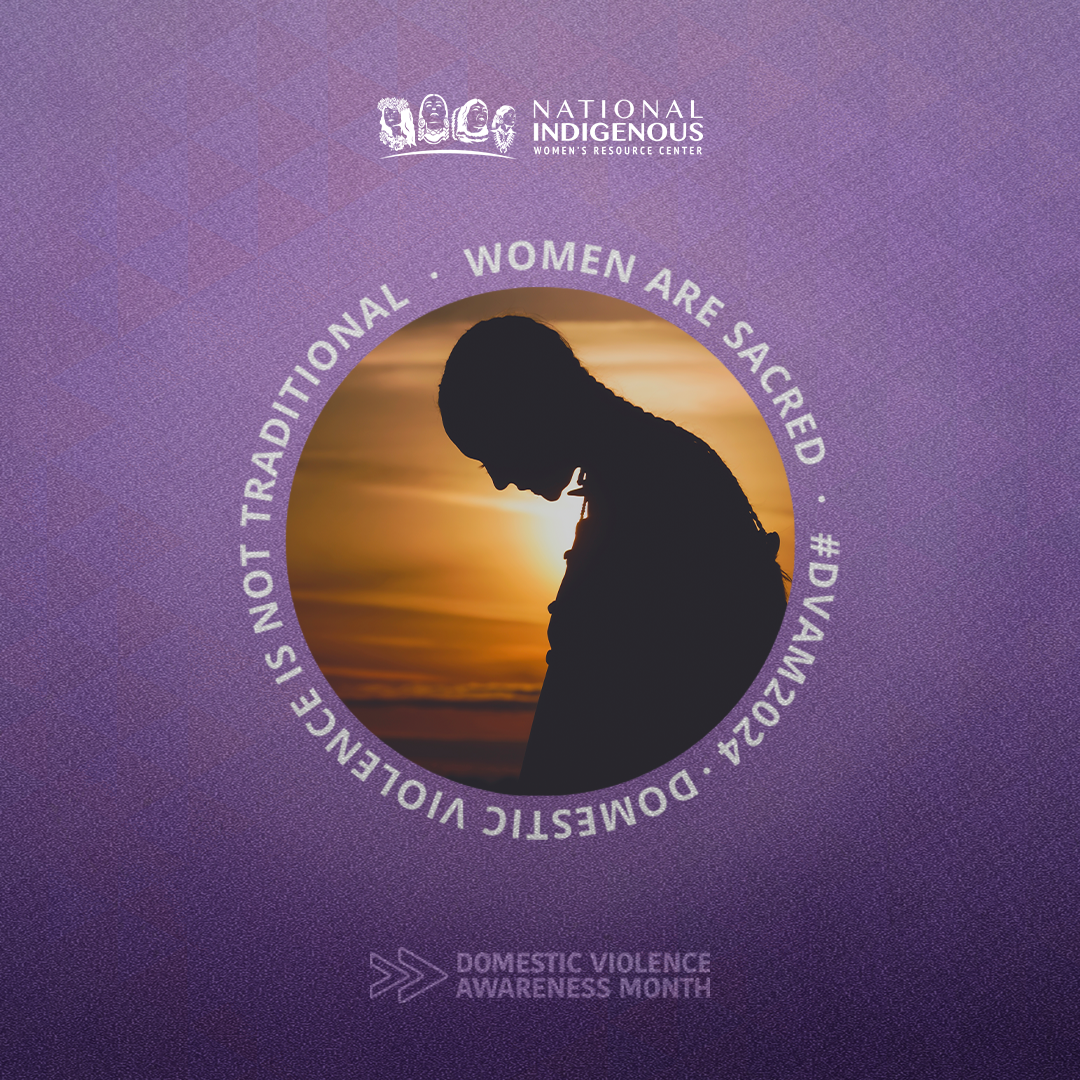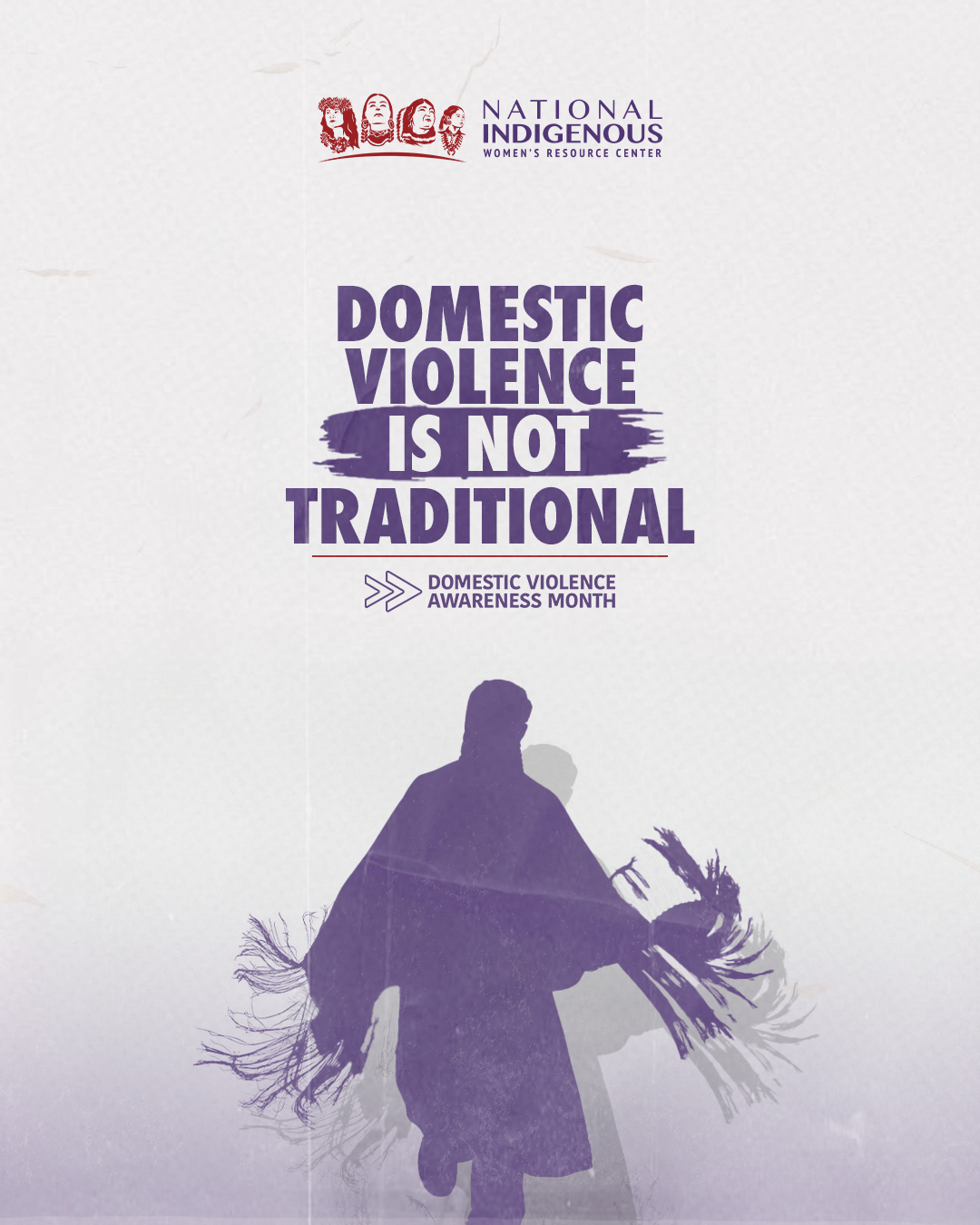Each October, the National Indigenous Women’s Resource Center (NIWRC) joins advocates and organizations nationwide to launch Domestic Violence Awareness Month (DVAM), a time to honor those we have lost to domestic violence, uplift the resilience of survivors, and strengthen our collective commitment to ending violence. Native women—including American Indian, Alaska Native, and Native Hawaiian women—face some of the highest rates of domestic violence in the United States, often lacking access to essential services for safety, justice, and healing. This reality underscores the urgent need to address this crisis within Indian Country.
Embracing the theme "Heal, Hold & Center," first introduced by the National Resource Center on Domestic Violence (NRCDV), NIWRC stands in solidarity with survivors and is dedicated to fostering healing within Tribal communities. This theme encourages us to heal by reclaiming traditional practices, hold space by actively listening to survivors, and center the voices of marginalized communities. NIWRC believes that by honoring the sacredness of all individuals, including women and children, we can support survivors on their journey toward recovery. Together, let us speak the truth that violence is not traditional.
Domestic violence encompasses various forms of abuse, including physical, emotional, verbal, sexual, financial, spiritual, and digital abuse directed at a relative. Intimate Partner Violence (IPV) is a specific type of domestic violence that occurs when a current or former spouse or intimate partner engages in a repetitive, fear-inducing pattern of abuse to maintain power and control in the relationship. This pattern of abuse can manifest in various types of relationships, whether couples are dating, married, living together, sharing a child, or have ended their relationship. The vast majority of IPV victims are women, with men being the primary offenders. In Indigenous societies, violence is not traditional. Instead, colonization has imposed and perpetuated the domination and ownership of Native women by men, a reality reflected in the violence against Native women that has persisted throughout history since contact, laying the groundwork for present-day violence.
As we prepare for Domestic Violence Awareness Month, domestic violence programs and communities are organizing intentional and motivational events to inspire change and uplift women and other survivors. Join us for an NIWRC webinar focusing on grassroots advocacy and showcasing the voices and expertise of Native women and survivors. You’ll discover valuable planning strategies, ideas, and resources to help your programs and communities create impactful DVAM events and campaigns. Watch the webinar!
Tuesday, October 1, 2024
- First Day of Domestic Violence Awareness Month
- Tillie Black Bear Women Are Sacred Day and 10-Year Memorial Event
10:00 a.m. - 4:00 p.m. CT | Rapid City, South Dakota
Hosted by NIWRC, the White Buffalo Calf Women's Society, the South Dakota Coalition Ending Domestic & Sexual Violence, and the Native Women's Society of the Great Plains, this gathering will honor the legacy of Matilda “Tillie” Black Bear, a champion for the rights and safety of Native women. The event will be held at the Best Western Ramkota, Rapid City, South Dakota.
Tuesday, October 15, 2024
- Tillie Black Bear: A Legacy of Resistance That Lives On" Documentary Screening
2:00 p.m. MT
Please join NIWRC for a live screening of our new documentary, Wa Wokiye Win (Woman Who Helps Everyone), which highlights and celebrates the work of Tillie Black Bear, known as the Grandmother of the Anti-Domestic Violence Movement. This documentary was created in collaboration with Tillie's daughter, Connie Black Bear Brushbreaker, and directed by Jax Agtuca. This webinar will be live-streamed on NIWRC's Youtube channel. Watch the Documentary!
Thursday, October 17, 2024
- Purple Thursday
Wearing purple honors three key themes of Domestic Violence Awareness Month: commemorating those we've lost, celebrating survivors' resilience, and fostering connections to combat violence. Join us in solidarity with survivors by wearing purple (shirts, sweaters, dresses, scarves, etc.) on Purple Thursday! Tag @niwrc and use the hashtag #PurpleThursday for a chance to be featured on our page.
Saturday, October 19, 2024
- #IWillRunForThem 5k
7:00 a.m. – 12:00 p.m. MT | Albuquerque, New Mexico
Join the Coalition to Stop Violence Against Native Women (CSVANW) for the annual I Will Run for Them 5K Run awareness run to honor the resilience, strength and spirit of Native relatives impacted by domestic violence. Learn more!
Help amplify the message of #DVAM2024 across social media! Let’s raise awareness, honor survivors, and promote healing throughout October. Here’s how you can get involved:
-
Social Media Toolkit: Use our suggested language to access and download Instagram, Facebook, and Twitter/X graphics.
-
Zoom Background: Show your support in meetings and webinars by using our themed background.
-
Hashtags: Use #DVAM2024, #HealHoldCenter, and #WomenAreSacred to show your support and spread awareness.
-
Connect with Us: Follow @niwrc on social media and tag us in your posts to join the conversation!



View NIWRC's 2024 DVAM Social Media Toolkit!
- Intimate Partner Violence Triangle
- Respect Wheel: Natural Life-Supporting Power Descriptions or purchase both in a bundle
- NIWRC Documentary: "Tillie Black Bear: A Legacy of Resistance That Lives On"
- Booklet: A Guide to Harmony For Women and Children Living in Shelter
- Booklet: From the Roots Up: An Overview of Shelter and Advocacy Program Development in Indian Country
- Restoration Magazine article: Unci Tillie Black Bear Annual Women Are Sacred Day, October 1
- Restoration Magazine article: Stories are our Medicine
- Toolkit: Creating Healing Spaces with and for 2S+/LGBTQ+ Victim-Survivors of Domestic Violence
- Domestic Violence Awareness: Action for Social Change from VAWnet.org
- Specialty Institute June 2022: Addressing the Spectrum of Housing for Victim/Survivors for DV, Sexual Violence, and Trafficking in Tribal Communities
- Webinar: Responding to Housing Insecurity/Homelessness Issues for Indigenous Elders who are Victims of Domestic Violence
- Webinar: Uplifting the Indigenous LGBTQ2S+ Community through Indigenous Empowerment and Intimate Partner Violence (IPV) Prevention
- Webinar: Domestic Violence and Disabilities
- Webinar: Understanding the Dynamics and Tactics of Intimate Partner Violence through the Lens of Indigenous Survivors
More than 4 in 5 American Indian and Alaska Native women (84.3%) have experienced violence in their lifetime. This includes:
- 56.1 % have experienced sexual violence
- 55.5 % have experienced physical violence by an intimate partner
- 48.8 % have experienced stalking
- 66.4 % have experienced psychological aggression by an intimate partner
The impact of Violence Among American Indian and Alaska Native victims of lifetime physical violence by intimate partners, stalking, and sexual violence:
- 66.5 percent of women and 26.0 percent of men were concerned for their safety
- 41.3 percent of women and 20.3 percent of men were physically injured
- 92.6 percent of women and 74.3 percent of men had talked to someone about what the perpetrators did
- 49.0 percent of women and 19.9 percent of men needed services because of what the perpetrators did
- 40.5 percent of women and 9.7 percent of men had to miss days of work or school because of what the perpetrators did
- The most common service needed was medical care (38.0 percent of female victims and 9.3 percent of male victims)
- 38.2 percent of American Indian and Alaska Native women and 16.9 percent of American Indian and Alaska Native men were unable to get the services they needed
Domestic Violence and Housing:
- Though Native women experience violence at incredibly disparate rates, it is just as alarming that only 38% of those women reported they were unable to access necessary services (such as shelter and legal assistance)
- There are 574 federally recognized Tribes and less than 50 Native domestic violence shelters nationwide
- 50% of the homeless population identify domestic violence as the primary cause
- Between 22% and 57% of homeless women report that domestic violence was the immediate cause of their homelessness
- 92% of homeless women have experienced severe physical or sexual abuse at some point in their lives
- 63% of homeless women have been victims of domestic violence
- 38% of domestic violence victims will become homeless at some point
**For Native women, the majority of these statistics are under-representative.
2010 Findings from Nat’l Intimate Partner & Sexual Violence Survey
The Intersection of Domestic Violence and Homelessness (2017), Safe Housing Partnerships, https://safehousingpartnerships.org/sites/default/files/2017-05/SHP-Homelessness%20and%20DV%20Inforgraphic_1.pdf
- StrongHearts Native Helpline: Call 1-844-7NATIVE (762-8483) for a confidential and anonymous helpline available 24/7. Designed for Native Americans and Alaska Natives, StrongHearts Native Helpline provides safe support and advocacy for domestic, dating, and sexual violence. To connect with a live advocate, visit strongheartshelpline.org and click the “Chat Now” icon.
- National Domestic Violence Hotline: Reach out at 1-800-799-7233 (SAFE) or TTY 1-800-787-3224.
- National Dating Abuse Helpline: Call 1-866-331-9474 or TTY 1-866-331-8453. You can also text “Loveis” to 22522 or visit loveisrespect.org for live chat support.





